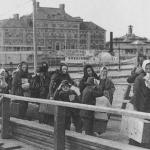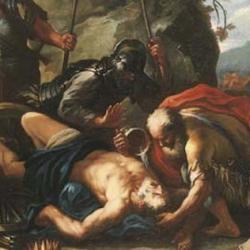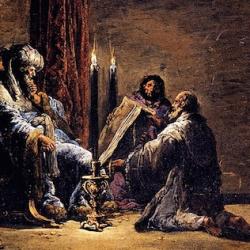Many commentators have noted the similarities between Josiah’s death (2 Chronicles 35) and that of Ahab (2 Chronicles 18). Christine Mitchell argues, however, that commentators often miss the irony of the Chronicler’s account, and some of the other precedents for Josiah’s death.
One irony has to do with the location of Josiah’s death. In 2 Kings, Josiah appears to die on the battlefield and his corpse is returned to Jerusalem. In 2 Chronicles, Josiah is still alive when he returns to Jerusalem. This fulfills Huldah’s prophecy that Josiah will be gathered to the grave in peace (2 Chronicles 34:26), but as Mitchell points out, the fulfillment is ironic (423). He does die in Jerusalem away from the battlefield, but he dies of war wounds.
Josiah’s retreat from the field establishes a typological connection with another king of the house of Ahab. In Chronicles, the only other king who leaves a battle is Jehoram of Israel, who goes to Samaria with war wounds. His cousin, Ahaziah of Judah, visits him there, and is slaughtered by Jehu.
Mitchell suggests that the parallels raise a theological question: “Ahaziah hides (chava’ hithpael) in Samaria before being located and executed (2 Chr 22:9). When we consider that the hithpael of chavash in 2 Chr 35:22 literally means ‘to let oneself be searched for,’ and that Jehu has to search for (baqash) Ahaziah, then we have another link to Josiah’s death. Ahaziah, of course, was a grandson of Ahab and was executed during Jehu’s purge of the House of Ahab. Unlike in the case of Josiah’s death, however, we are given a reason for Ahaziah going out (yatza’) to Jehu—it was ‘from God.’ Ahaziah’s death is ordained. Perhaps Josiah’s death also is ‘ordained’—as in fact Neco implies in 2 Chr 35:21″ (424-5).
Even if this connection is forced, the Chronicler still links “Josiah’s death in 2 Chronicles 35 with the deaths of two kings soundly condemned by the Chronicler—and both are linked with Ahab” (425).
Josiah’s death also resembles Saul’s, which puts Josiah “firmly in the shadow of Ahab (and Saul, Amaziah, and Ahaziah). The account also acts as a frame within 1–2 Chronicles: the first account of a king’s death and the last account of a king’s death show the king’s death as occurring in the same way” (431).
Amaziah’s death (2 Chronicles 25) also resembles Josiah’s. He aggressively seeks a showdown with his northern counterpart, Joash of Israel. Joash warns him off, but Amaziah presses forward anyway. It looks a lot like Josiah’s aggressive stance toward Neco. Amaziah’s death, like Ahaziah’s, is said to be “from God” (25:20), and the parallel again raises the question of whether Josiah’s death is also a punishment for refusing to listen to the word of Yahweh (425).
Mitchell doesn’t think this is Josiah’s sin. She points out that Yahweh doesn’t explicitly endorse Josiah’s reforms or his Passover (cf. 30:20, regarding Hezekiah’s Passover). She argues that the flaw in the Passover had to do with Josiah’s use of Levites:
“If we look at Levitical function in 2 Chronicles 34 compared with 1 Chronicles 23–27 and 2 Chronicles 29, however, perhaps what we are seeing is Josiah expanding the Levitical role past what would have been considered appropriate. That there was another opinion about the role of the Levites is clear from Ezek 44:9-14, where their function is held to be a form of punishment, a form of shaming: they are not to be (Zadokite) priests” (430).
Hezekiah had to expand the role of the Levites because the priests couldn’t handle the number of sacrifices. Josiah “takes the arrangements made for the overabundance of Hezekiah’s rituals and formalizes them” (430). For that over-reach, he dies like Ahab and Saul.
Maintaining distinctions between priest and non-priest is certainly a concern of the Chronicler (cf. Uzziah, who contracts leprosy for seizing priestly privilege). But if Josiah dies because he allows Levites to slaughter and skin the animals, the Chronicler is exceedingly subtle about it. It’s not clear that the priests are required to skin and dismember sacrificial animals; Leviticus 3:6 appears to refer to the worshiper when it says “he shall skin . . . and cut.”
In fact, the actions of priests and Levites are repeatedly authorized by the “king’s command” (35:10) or by conformity to the “book of Moses” (35:12) or the “ordinance” (35:13). That’s hardly the language one expects if the Chronicler is describing a mortal sin.
It seems that the more traditional view is right: Josiah dies because he refuses to hear the word of Yahweh that comes to him through Neco. Josiah’s life-story follows the two-stage life-history of Asa. Asa initially trusts Yahweh and hears his prophet but then relies on international alliances and refuses to hear the prophet. Likewise, Josiah initially receives the law and Huldah’s prophecy, but then refuses to hear the “words of Neco from the mouth of God” (35:22).
That Yahweh’s word is coming from the mouth of a Gentile king fits the trajectory of the closing chapters of 2 Chronicles, which are rushing headlong to the final words spoken by Cyrus the Persian, whose spirit is stirred to say “May Yahweh be with him, and let him go up!” (36:22-23).
(Mitchell, “The Ironic Death of Josiah in 2 Chronicles,” CBQ 68 [2006] 421-35.)












